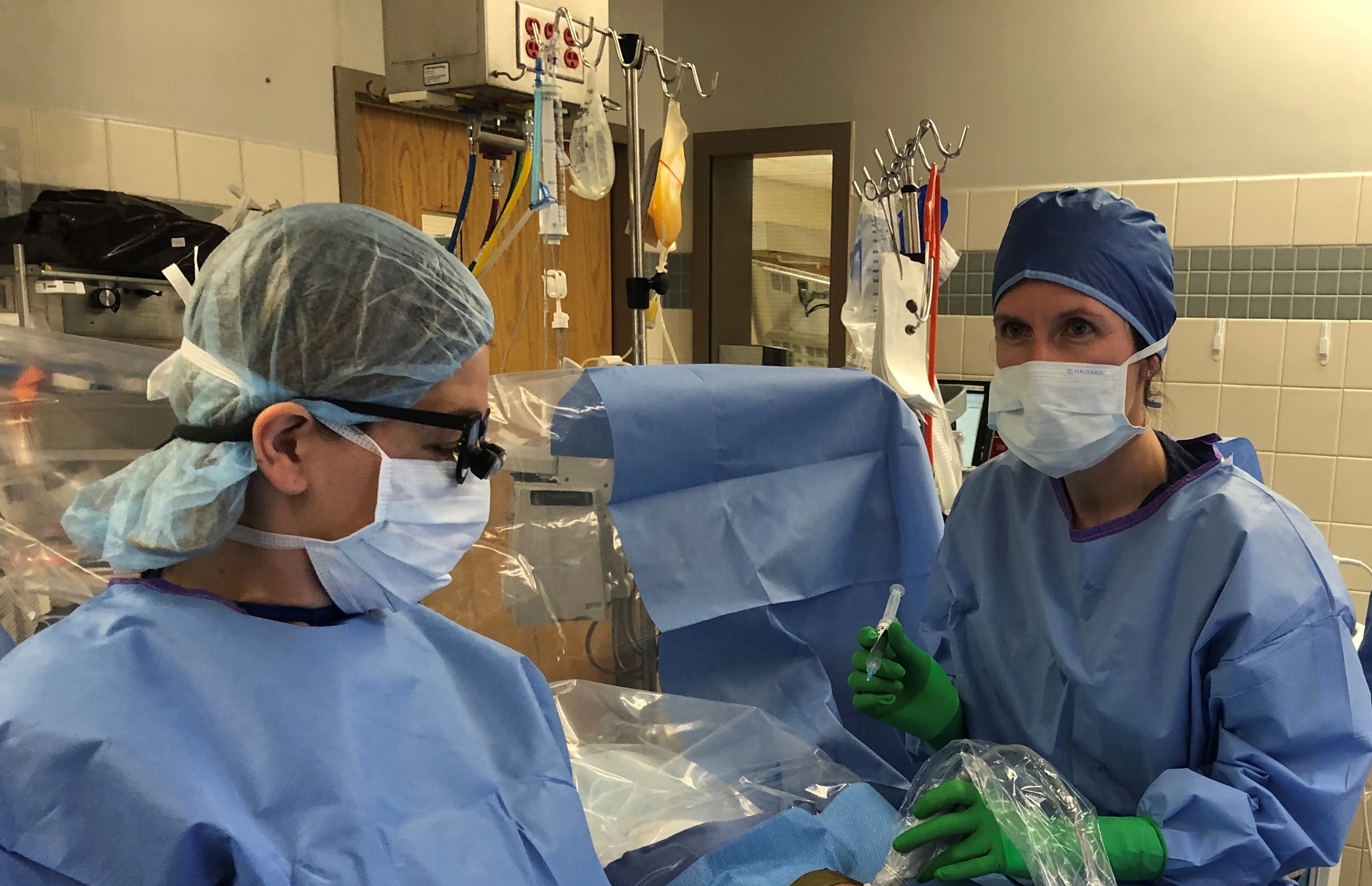Pediatric Pain Medicine Team’s Use of Innovative Technology Offers Better Patient Experience
Treating surgical patients with pain medicine requires compassionate care and precision, but when it comes to treating young children, there comes an extra layer of attentiveness.
“Before taking children to surgery, we get the question, ‘Is it going to hurt when I wake up?’” Sarah Hall, MD, PhD, assistant professor of anesthesiology at the University of Kentucky College of Medicine, said. “It’s very close to all of our hearts that it’s not an emotionally distressing experience, as we can help it.”
Dr. Hall and the pediatrics pain medicine team at UK HealthCare, the College of Medicine’s clinical enterprise, aim to help patients and their families adjust to the experience by working together to closely follow a child’s treatment before, during, and after leaving the operating room. They also offer a variety of approaches, including a more recent form of pain medicine administration for children, nerve blocks, which help numb some or all of the entire area around a surgical incision or injury.
When she was in the midst of her anesthesiology residency training, Dr. Hall was curious to why nerve blocks were typically limited to adult patients, later understanding it was likely to fear or lack of familiarity. However, since she started working at UK nearly three years ago, she has seen the total number of nerve block procedures more than quadruple on a per-year basis. The pediatrics pain medicine team at UK HealthCare treats around 150 patients a year, collaborating with various physicians from different specialties, and the number of nerve blocks has continued to increase every month.
“Our team really stepped it up and made it our mission to offer a regional anesthesia or nerve blocks to every child who is a candidate who will benefit from it,” Dr. Hall said.
Examples of using a nerve block would be for orthopedic surgery on an arm, leg, hips or spine, removal of an appendix or gallbladder, feeding tube placements, cancer tumor removal, and thoracic surgery for pneumonia. For these procedures the pediatric pain medicine team has forged strong collaborations with Shriners Hospitals for Children Medical Center, Kentucky Children’s Hospital, the Neonatal Intensive Care Unit (NICU), the Pediatric Intensive Care Unit (PICU), the Kentucky DanceBlue Clinic, child life specialists, and recently, the Pediatric Palliative Care team. With the close partnership of Pediatric Palliative Care, the pediatric pain team has even been able to offer long term continuous nerve catheters for reducing cancer-related pain at home in children and young adults on hospice care.
Dr. Hall said her team has been able to offer this uncommon form of treatment for what they understand to be some of the youngest, smallest patients across the country.
“We do believe nerve blocks significantly help these young patients and decrease the post-operative opioids (pain medicines) that are required,” she said. “Normally, children end up needing to be on a continuous infusion of morphine or other agents, but we’ve seen that these nerve blocks can reduce the dosage of pain medicine needed following a procedure.”
For concerned parents who worry about possible addiction to opioid pain medicines, Dr. Hall said the team – consisting of pediatric anesthesiologists, pediatric anesthesiology resident physicians, acute pain nurses, UK perioperative nurses, and KCH pediatric nurses – reassures them by offering a variety of options and tailoring the treatment to what will work best for the patient, including following their medication schedule after they leave the hospital. That team includes Dr. Victoria Bradford, Dr. Robert Weaver, Dr. Kit Mongtomery, Dr. Raeford Brown, Dr. Julie Lewis, Dr. Victoria Saites, Dr. Edwin Bowe, Dr. Rebecca Layton, Dr. Faith Lukens, with support of the leader of the adult acute pain service, Dr. Lauren Sayre.
Meanwhile, all types of learners at UK and the College of Medicine – undergraduates, pre-nursing students, medical students, visiting medical students, pediatrics residents, nurse interns and PICU advanced practice providers – have opportunities to learn about these innovative procedures alongside the pediatrics pain medicine team, including Dr. Hall.
“Dr. Hall teaches by example. She is the role model of professionalism,” Robert Gaiser, MD, chair of the department of anesthesiology, said. “She always has the best interest of the patient and works well with colleagues. In every interaction, all leave knowing that knowledge has improved and the bar for professionalism has been set even higher.”
As she teaches learners about the advancements in pain medicine, Dr. Hall’s passion for her “incredibly rewarding” career shines through.
“My energy for helping children is endless,” she said. “No child asks to be here. They didn’t do anything wrong, but the more people we can surround them with to make it a more comfortable experience, the better.”
